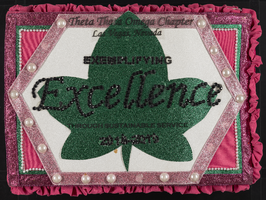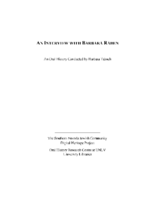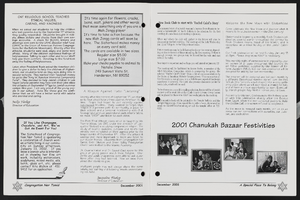Search the Special Collections and Archives Portal
Search Results

Alpha Kappa Alpha Sorority, Theta Theta Omega Chapter scrapbook: "Exemplifying excellence through sustainable service"
Date
Archival Collection
Description
From the Alpha Kappa Alpha Sorority, Incorporated, Theta Theta Omega Chapter Records (MS-01014).
Mixed Content

Transcript of interview with Danny Lee by Claytee White and Stefani Evans, May 23, 2016
Date
Archival Collection
Description
Folks who graduated Boulder City High School in 1953 and who began kindergarten there might remember being in kindergarten class with Clark D. "Danny" Lee. They would be excused for not remembering the towheaded Lee; after all, he was in Boulder City only for the first half of the year. They also would be excused for not remembering Lee because he never stayed in school once he arrived. Danny was the child whose mother faithfully brought him to class every day. And every day, as soon as his mother dropped him off, he took off and beat his mother home. Danny Lee was born in his grandparents’ house in North Las Vegas, grew up on 10 Bonneville Street, and (except for his first semester of kindergarten in Boulder City) attended Fifth Street Elementary School and Las Vegas High School, where he graduated in 1953 with Rex Bell. In 1960 he married fellow Las Vegas High grad and former Rhythmette, Dorothy Damron; they have raised four children. Here, Lee talks about the difficulties his father had finding work and supporting a family during the Great Depression-of living with relatives and moving from place to place in the small travel trailer as his father found work. He describes a hardscrabble Las Vegas, where he and other kids in in multiethnic groups found temporary work helping drovers in the stockyards or filling blocks of ice in the icehouse. He recalls working for Superior Tire during high school and for the Union Pacific Railroad in a variety of jobs after graduation and the U.S. Army-including a stint as a Union Pacific tour director. v Lee’s early kindergarten career seems an unlikely academic indicator for a man who would spend most of his adult life volunteering for and lobbying on behalf of Clark County public libraries and who the American Library Association would select as the 1990 Library Trustee of the Year. Ironically, Lee was asked to serve on the Clark County Library District board of directors to get rid of a troublesome library director. Instead, he became one of the director’s staunchest advocates. It is appropriate that Danny and his wife, Dorothy, are pictured here surrounded by library books. The native Las Vegan built a lifetime career as a State Farm Insurance salesman, but in this interview he focuses on his public library advocacy, his time as trustee for the Clark County Library District; the formation of the Las Vegas-Clark County Library District; the ambitious building program funded by $80 million in voter-approved statewide bonds; and the political wrangling in Carson City necessary to achieve these ends. Lee’s oral history complements that of his wife, Dorothy Lee, and of Charles Hunsberger, who was the “troublesome” library director at the time Lee was trustee. Lee made his living as an insurance salesman. Lee’s ability to sell a product-whether it be insurance or an $80 million bond issue-is the attribute that made Danny Lee so valuable as a trustee to the Las Vegas-Clark County Library District and consequently, to all Clark County residents who value public library services. However, his passion, and dedication, and unbowed determination earned him the Library Trustee of the Year award. As Lee closes the interview, he locks eyes with Dorothy and muses, "Let me tell you what I'm most proud of in all . . . I've been married to this lady for fifty six years now. . . . I've lived a very blessed life. Being born in my grandmother's house and having lived in little travel trailers, it's just good. It's worked. We're living like we've always wanted to live right now."
Text

Richard C. MacDonald interview, September 20, 2016: transcript
Date
Archival Collection
Description
Henderson developer and Philadelphia native Richard MacDonald is a natural storyteller, and he has stories to tell. The man behind MacDonald Highlands and the Dragon Ridge Country Club first moved to Las Vegas as a young teen with his parents in 1959. After graduating Las Vegas High School in 1963, his parents moved to Hawaii and he enrolled at Nevada Southern University (now UNLV) and supported himself in Las Vegas by selling unfinished houses. His parents convinced him to move to Hawaii, where he attended the University of Hawaii worked with his father selling blocks of pre-developed cemetery lots to Asian buyers. In this interview, MacDonald describes his experience as a white man facing racial discrimination, of Las Vegas as Hawaii's Ninth Island, of earning his real estate broker's license, and of his father's plan to develop and sell Las Vegas property to Hawaiians. Returning to Las Vegas, MacDonald worked with Frank Sala and Chuck Ruthe to obtain his first two sections of Henderson land, which became Sun City MacDonald Ranch and the western part of MacDonald Highlands. He talks of developing Sunridge at MacDonald Ranch on Eastern Avenue and The Canyons at MacDonald Ranch. He also speaks to local prejudice against Hawaiians and to the way the City of Henderson favored Hank Greenspun and American Nevada Corporation. He recalls his twenty-year experience as a developer with the City of Henderson, its planning commission, city manager, city attorney, and city council. He reveals associations with Del Webb and the Del Webb CEO, Anthem, the Bureau of Land Management (BLM), the Sultan of Brunei, and polo fields as well as Red Alerts, the Foothills project, and MacDonald Highlands. Along the way he talks of golf course architects and planners and the MacDonald Highlands golf course, his family, the Great Recession, and his current status with the City of Henderson and the Archaeological Institute of America.
Text

Transcript of interview with Priscilla Scalley by Claytee White, July 24, 2014
Date
Archival Collection
Description
Priscilla and Joe Scalley arrived in Las Vegas in 1972 with their two young daughters. Joe had just completed his residency in radiology and came to Las Vegas to practice at Sunrise Hospital, where he eventually became Southern Nevada’s first neuroradiologist. The couple took out two mortgages to buy their house at 2900 Justice Lane, in the Rancho Nevada Estates section of Ward 1. They were the second owners of the house, which had been built in 1967. In 1993, after their daughters had graduated from high school, the Scalleys sold the house and moved to Summerlin. Joe Scalley died in October 1994. After Joe died Priscilla became reacquainted with and married the father of one of her daughters’ childhood friends, Joel Jobst, who was also widowed. Joel was a nuclear physicist retired from the Nevada Test Site. Priscilla and Joel bought a vacation home in Montana, where they spent every summer. They celebrated 13 years of marriage before Joel passed in 2013. As a young mother Priscilla joined the West Charleston Elementary School Parent Teacher Association and eventually became president. She helped found the Friends of the Libraries when the Clark County Library District had only two libraries—Flamingo Library and West Charleston Library—and served as that group’s president. She also was active in Junior League of Las Vegas and was president 1983?84. In her early forties Priscilla became a travel agent, a career that kindled a passion for travel that still burns brightly. She also is interested in genealogy. Although she has traveled the world she yearns to take her daughters, sons in law, and grandchildren to Ireland, the land of her ancestors.
Text

Transcript of interview with J.W. Campbell by Raymond Haft, February 19, 1979
Date
Description
On February 19, 1979, Raymond Haft interviewed his friend, J. W. Campbell (born June 13, 1918 in Pioche, Nevada). This interview covers the history of Nevada, including Mr. Campbell’s personal history and the growth of Nevada, overall. Mr. Campbell discusses the Stewart Ranch, the Mormon Fort, swimming pools in Las Vegas, and the above ground atomic tests. He also recalls the crash of Carole Lombard’s plane and the building of the Basic Magnesium Plant in Henderson. Mr. Campbell calls Las Vegas a “One industry town,” stating that gambling (and tourism) are the main and major factors in Las Vegas, Nevada.
Text

Transcript of interview with Janet Savalli by Irene Rostine, September 21, 1996
Date
Archival Collection
Description
Interviewed by Irene Rostine. Janet Savalli's family moved from Phoenix, Arizona, to Henderson, Nevada, in 1945 so her father could work at the Basic Magnesium plant. A few years later, when she was a junior in high school, Janet began her 46-plus years career at the Southern Nevada Telephone Company, which eventually became Sprint. During that period she held several positions, including operator, supervisor, schedule clerk, trainer, investigator, and community relations coordinator. Janet also talks about the atomic bomb testing at Camp Mercury and Camp Desert Rock near Las Vegas. Janet credits the atomic bomb testing with jump-starting the second wave of growth Las Vegas experienced following World War II. This growth had a particular influence on the telecommunications industry's need to expand in Las Vegas.
Text

Transcript of interview with Todd S. Polikoff by Barbara Tabach, August 30, 2016
Date
Archival Collection
Description
In 2015, Todd S. Polikoff was named the President & Chief Executive Officer of the Jewish Federation of Las Vegas. (The organization is now known as Jewish Nevada). Todd is a graduate of Stockton University and earned his MBA at Cleveland State University. He has three children: Samuel, Shira and Jordan. Born in 1971 to a steelworker and hairdresser, Jack and Judy Polikoff, Todd grew up in Philadelphia, became a bar mitzvah there, and shocked his mother when he explained he was putting college on hold to move to Israel. In addition to stories about these life memories, Todd also traces his career path to decision-making to a meaningful trip to Moscow a where a defining moment helped him understand his own relationship with Judaism. To the time of this interview, Todd has invested over twenty years in leadership of Jewish Federation and AIPAC in states that include New Jersey, Delaware, Texas, Ohio and Nevada.
Text

Transcript of interview with Adele Baratz by Steve McClenachan, March 3-4, 1979
Date
Archival Collection
Description
Interview with Adele Baratz by Steve McClenachan on March 3 and 4, 1979. In this interview, Baratz talks about growing up in Las Vegas and her her schooling. She graduated from Las Vegas High School in 1944, and discusses the rationing that took place during World War II. She went to Maryland for nursing school and returned to Las Vegas in 1947. She describes some of the hotels and casinos, and tells the story of her father trading property for an automobile in 1935. She also recalls the building of Hoover Dam, swimming in local pools, and going to Mount Charleston in the winter. The interviewer asks her about travel between Las Vegas and California and the impact of Atlantic City on Las Vegas tourism. Baratz then talks about her nursing career and starting a re-certification program in 1974 and the different hospitals in the area.
Text

Transcript of interview with Barbara Raben by Barbara Tabach, February 24, 2015
Date
Archival Collection
Description
Interview with Barbara Raben by Barbara Tabach on February 24, 2015. In the first part of the interview Raben discusses her involvement with Hadassah in Southern Nevada, and the various groups within that organization. During the second part of the interview, she talks about her family and her relationship to Judaism, and moving to Las Vegas in 1991. Raben discusses the business she built in Los Angeles and Las Vegas called the Candy Factory. She then talks about the formation of Midbar Kodesh with other families from Temple Beth Sholom. Raben continues to be involved in the Jewish community and the Jewish Family Service Agency.
In 1945, Barbara Raben was born to Kermit and Adele Shulman, children of Eastern European emigrants. She enjoyed a happy childhood in Stamford, Connecticut, and was raised with a strong Jewish identity. After attending college in New Jersey, Barbara married Richard Grisar, and the couple lived in London for a year, before returning to Stamford. In 1975, Barbara and Richard moved to Los Angeles where Barbara owned and operated a very successful candy business, Candy Factory. Sixteen years later, Barbara sold her business, and the family relocated permanently to Las Vegas, where her husband owned radio stations. Barbara has always been an active member of the Jewish community, wherever she lived, giving her time to synagogue, children's day school and service organizations. Upon arriving in Las Vegas, Barbara and her family were members of Temple Beth Sholom, before leaving the congregation to start Midbar Kodesh Temple with a small group of other families. She has been an active member of Hadassah Southern Nevada Chapter for over a decade, helping rebuild the organization locally after participating in the Hadassah Leadership Academy, a program designed to engage a younger generation of members. Currently, Barbara serves as board president and interim executive director for Jewish Family Service. In 2004, then a widow, she married Terry Raben. Barbara has four sons with her first husband: Michael, Andrew, David and Marc Grisar.
Text

